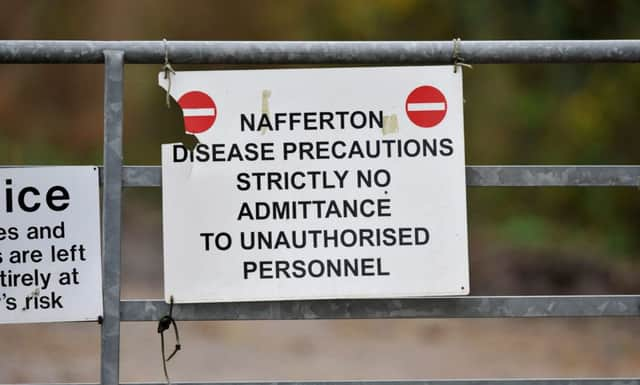Urgent measures to prevent spread of bird flu from Nafferton Farm


Farmers around the country have been warned to be on alert after at least one case of the virus was confirmed at a duck breeding farm in the Driffield area of East Yorkshire.
A 10km restriction zone has been put in place and all poultry on the farm is being culled in an attempt to prevent the spread of the disease.
Advertisement
Hide AdAdvertisement
Hide AdChief veterinary officer Nigel Gibbens said more cases could follow.
He said: “We cannot rule out that there might be further cases; this is why we put premises under restriction to look for further spread.
“Because there’s a wild bird risk we also need farmers and their vets all over the country to be alert to possible disease in their farm that they can’t explain, draw those to our attention so we can investigate quickly, and, if there is any more disease, seek to nip that in the bud as well.”
The Department for Environment, Food & Rural Affairs (Defra) confirmed the outbreak it is investigating is the H5 virus, but ruled out the H5N1 strain, which has caused deaths in humans.
Advertisement
Hide AdAdvertisement
Hide AdThe last reported case of H5N1 was in 2008. A few instances of bird flu have been detected in poultry farms since then but none has involved the more dangerous H5 or H7 strains.
Defra insisted the risk to public health is “very low” and there is no risk to the food chain.
Officials believe the outbreak may be linked to Germany and the Netherlands. The transport of poultry and eggs throughout the Netherlands was banned yesterday after an outbreak of bird flu was confirmed at a chicken farm in Hekendorp.
Mr Gibbens said the British farm at the centre of the alert, which has not been identified, has good bio-security in place so the risk of spread is “probably quite low”.
Advertisement
Hide AdAdvertisement
Hide AdHe said: “When we find this disease we take quick action to remove the birds as a possible source of further infection and we also restrict all the farms with birds in an area around it of 10km to look for possible further spread or possible other infected farms so we can get on top of those early as well.
“In parallel with that we’ll be looking for other possible sources of the disease, including any links to the disease that we’re seeing in the Netherlands and Germany, and that will include looking at the risk from wild bird spread to our national flock.
“From what we know so far we know this is a strain that is highly pathogenic to birds, so this is a disease of poultry.
“The link to the disease that they found in Germany and the Netherlands is our most likely source and, on that basis, Public Health England has said with this strain there is not a risk to public health.
Advertisement
Hide AdAdvertisement
Hide Ad“The people dealing with the birds directly, that’s the highest risk, and we’ll be working to make sure that they’re protected with proper hygiene precautions as they’re handling the birds.
“The main focus is to protect our bird flock rather than any risk to public health.”
Most types of bird flu are harmless to humans but two types - H5N1 and H7N9 - have caused serious concern, according to the NHS website.
The World Health Organisation recorded 377 deaths from H5N1 in 15 countries by July last year.
Advertisement
Hide AdAdvertisement
Hide AdThere have been no cases of human infection with bird flu in the UK.
A Public Health England spokesman said: “Public Health England are assisting Defra in the investigation of an avian flu outbreak at a duck breeding farm in Yorkshire.
“Based on what we know about this specific strain of avian influenza the risk to human health in this case is considered extremely low.’’
A spokesman for the National Farmers’ Union said: “We understand that there has been an outbreak of bird flu at a Yorkshire duck farm. We understand from Public Health England that the risk to public health is very low. Defra has introduced a restriction zone and there will be a cull of birds on the farm. We will give any further updates when we have more information.”
READ MORE:
Advertisement
Hide AdAdvertisement
Hide Ad